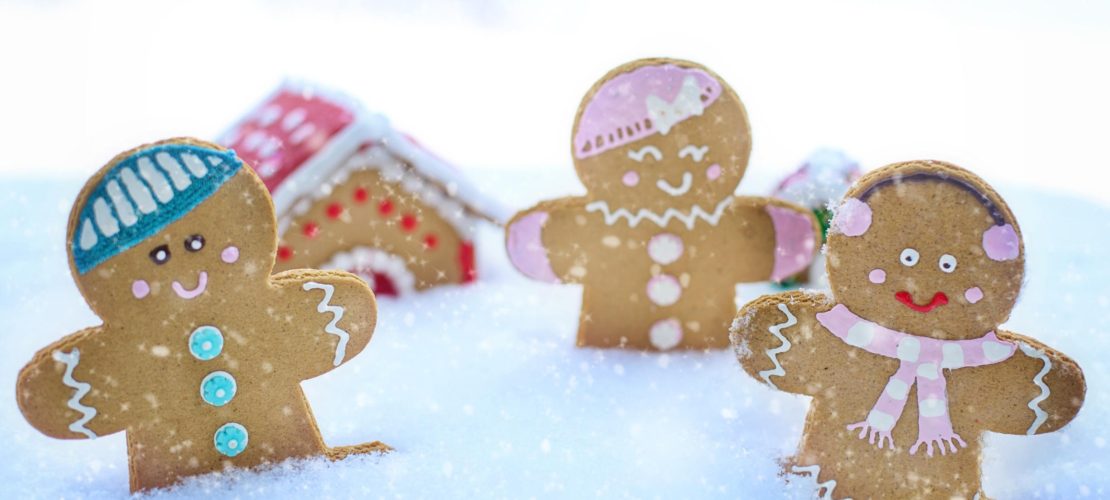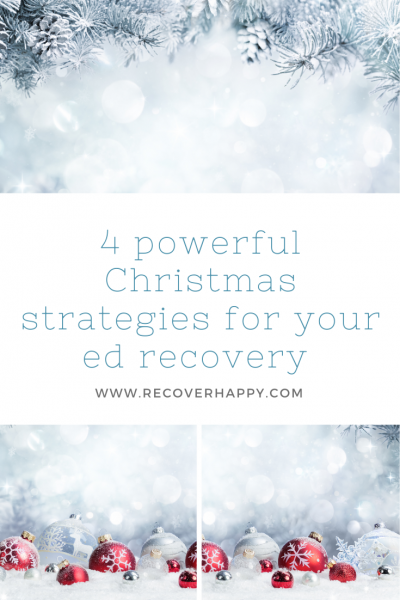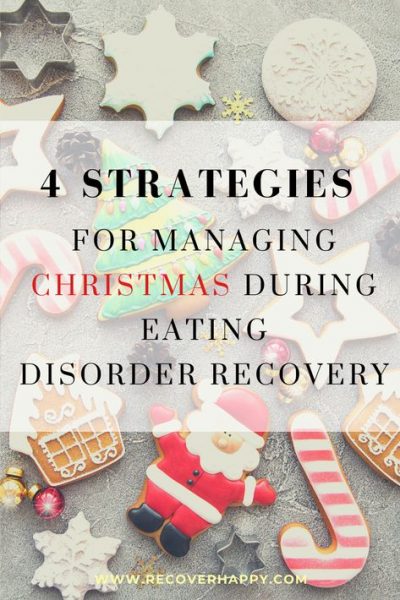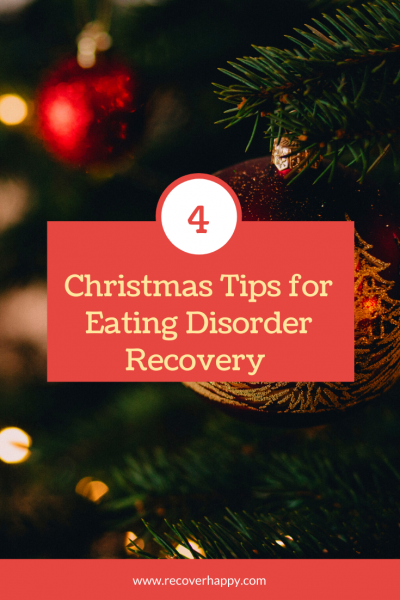4 powerful Christmas strategies for your eating disorder recovery

By Tanja _ December 09, 2019
What is the first thought that comes to your mind when you think about Christmas? Do you feel overwhelmed by this time of the year, because there will be a lot of food involved that causes you anxiety? Are you scared that family members will judge your eating and make comments about your body? Are you worried that the Christmas season will have a negative impact on your eating disorder recovery? It is important to know that you are not alone with these fears, as it is quite common that the symptoms of an eating disorder increase as the Christmas season approaches.
I remember struggling so much during the Christmas season. I experienced it as a very stressful, anxious and overwhelming time of year. I felt pressure to break my rules and routines around food to pretend that everything was ok with me during holiday gatherings and family reunions. In my 10 years of suffering from anorexia nervosa, I always told myself to lose some weight before this time of the year, so that I could eat “normally” and enjoy meals like everyone else. However, the hard reality was that this rarely worked and I usually ended up feeling guilty. And I hardly enjoyed the holiday season at all.
How can you make this Christmas a wonderful and joyful experience during your eating disorder recovery? While there is no simple fix, it is entirely possible to have a good time without letting your eating disorder patterns to take over and ruin your Christmas. I would like to share 4 powerful strategies that will help you to manage your stress and anxiety so that you can enjoy the magical Christmas season as much as possible.
1. Create a coping plan for the challenges
It can be very helpful to create a coping plan with someone you trust. You could decide what foods you plan to have at any Christmas dinners and parties and also what “fear foods” you could include. Additionally, try to identify alone or with someone you trust what challenges you might face and develop strategies to cope with some difficult situations.
A very powerful method that I always recommend to my clients is to do journal dialogues between your eating disorder-self and your healthy-self. You could prepare yourself to deal with your eating disorder thoughts, comments about others’ diets, others weight loss or gain or how much or little you are eating. Think about the kind of comments you might get from others about your eating habits in social situations. Then plan some responses to these comments. You can choose whether to say these comments out loud, or whether say it to yourself in your mind, to help you cope with the situation.
Even though you can’t plan for everything, a plan will give you the feeling of being in charge and you are more likely to know how to react when things get challenging.
2. Create healthy boundaries
Think in advance about Christmas activities in which you would like to participate and set realistic expectations. It can be helpful to simplify things as much as you can, so that you don’t end up with your mind thinking “I must do that” or “I must do this”. Try to focus on the non-food-related things about Christmas, such as spending time with your family, visiting Christmas markets, viewing lights and decorations.
Also remember to put your recovery first. You don’t need to please people all the time. It is ok to say “no” if you don’t want to eat a cookie or not to attend events that might trigger your eating disorder behaviours. If people can’t deal with this, that’s their problem and not yours. Try to follow your meal plan, but also allow yourself some flexibility, if you want to try new things.
Keep in mind that you always have the freedom to leave an event if it becomes too challenging for you. This will help you to feel more confident and in control.
3. Practice self-compassion and self-care
Even people who don’t suffer from an eating disorder usually struggle with their diet during the Christmas season. As it is quite common to overeat in our culture. But if you are recovering from an eating disorder, this can be even more difficult. This is especially the case if you have eaten more or less than you have planned for. Even though you feel like you have failed, don’t beat yourself up, as this only serves to make you feel even worse. Instead, be proud of yourself for being so brave. You decided to step out of your comfort zone and you alone decided to face your fears and challenges.
Each day of the holidays, remember that you are doing the best you can. Be understanding and compassionate towards yourself. Try to do nice and relaxing things for yourself, such as having a spa day, getting a massage, meditating, drinking a special tea or simply reading a book on the sofa.
4. Reach out for support
Having a support person is a crucial part of your recovery and can be extremely powerful, especially during stressful times like the Christmas season. You could try to identify a friend or family member (if this feels safe for you), who will be there for you when you begin to struggle or panic. Tell them what your worries are and ask them if you can lean on them when dealing with fears and challenges.
If you don’t feel comfortable letting people know that you are in recovery, you could look for online support or communities. Remember there are a lot of people who are facing similar issues and just sharing your experiences with others can give you a lot of strength in facing your challenges.
Be kind to yourself and try not to blame yourself for being in this situation. This time of the year can be tough, but it can also be a joyful and helpful part of your recovery journey.
You don’t need to struggle alone on your recovery journey. Simply get in touch to discuss how I can help you.
It is entirely possible to overcome an eating disorder – I have done it, others have done it and so can you!




